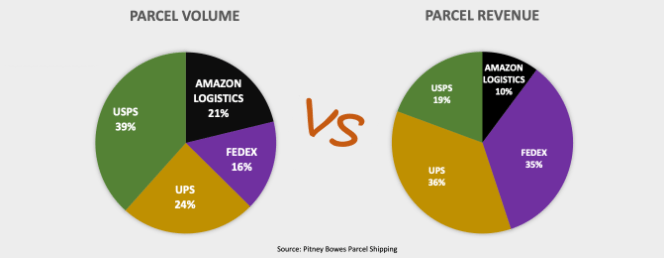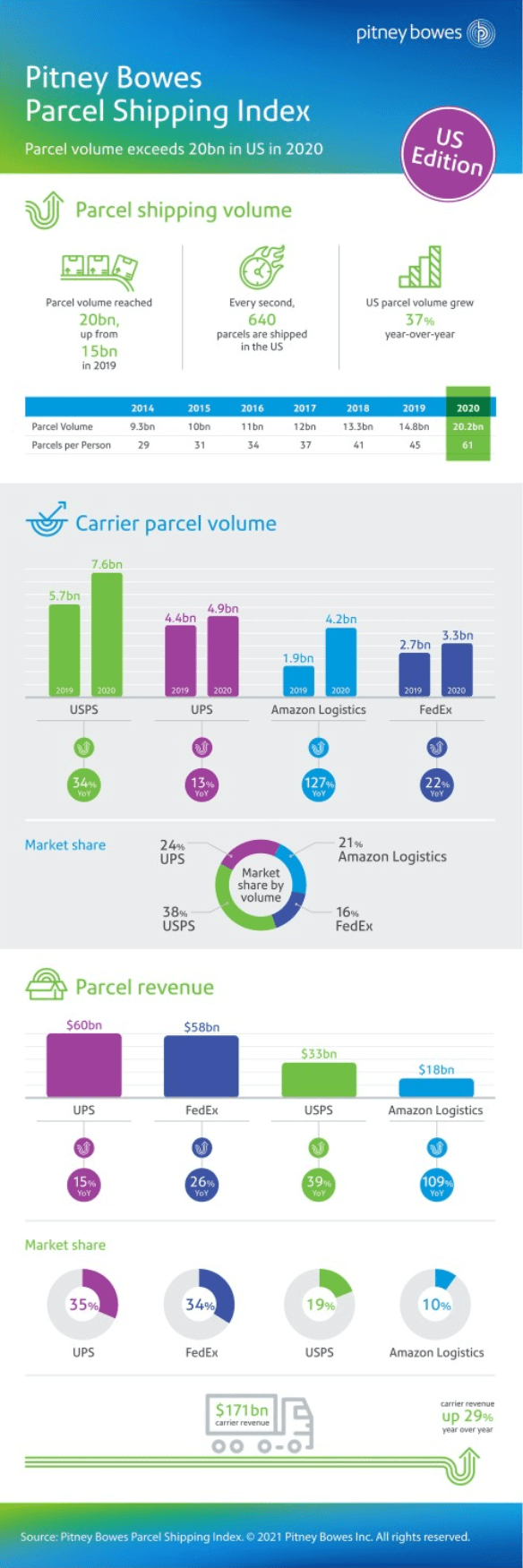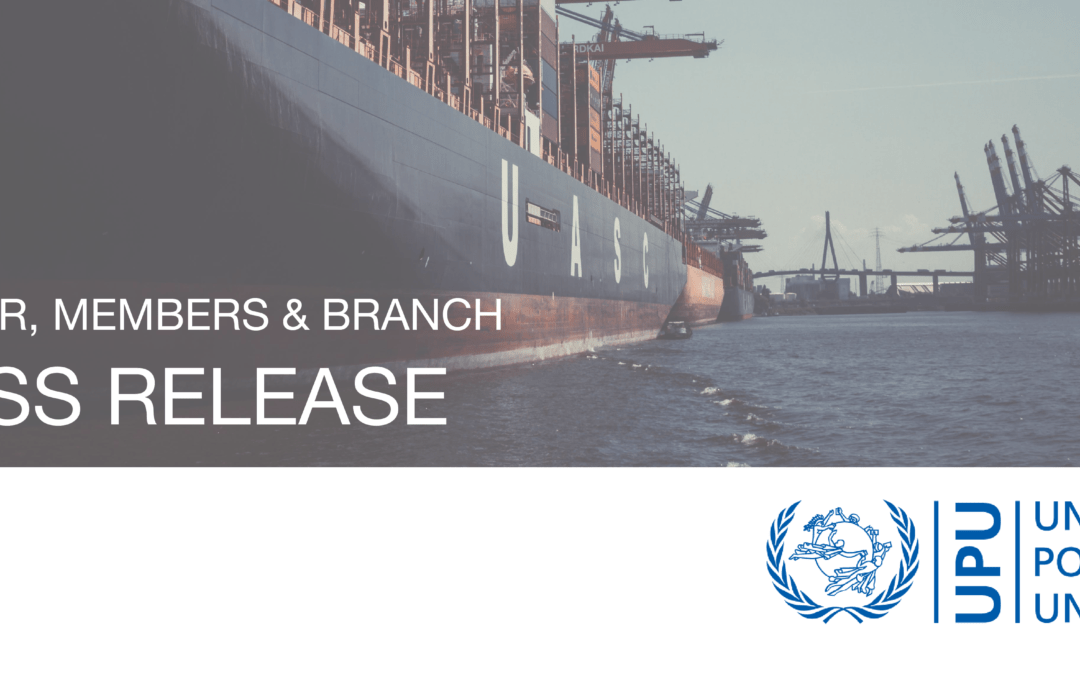
US Parcel delivery market: some comments
Pitney Bowes has released in its latest Parcel Shipping Index the last numbers of the US parcel delivery market. Those numbers show a tremendous change in the market with Amazon logistics being now ranked third, behind UPS but before Fedex, with an annual growth of 127%.
We can notice that things are significantly different when it is about revenues. From this perspective UPS is first, FEDEX second and Amazon logistics fourth.
I would like to comment those numbers because I think it tells a lot about those companies’ strategy but also about the potential transformations of the transport/logistics market worldwide.
It is not a mystery, FEDEX and UPS are doing cherry picking in selecting customers with the best Revenue Per Piece (RPP). Previously, it was by privileging B2B, but as B2C ecommerce is now the core of the market, they are now targeting the most profitable B2C businesses. In addition, those companies use to have a well-known strategy of volume caps (to contain costs) and surcharges (as the seasonal peak surcharge) to maximize revenues. The surge in UPS and Fedex revenues (and profitability) is also linked to those mechanisms that were super effective during the COVID’s volume peaks.
Amazon has a different strategy and is constantly looking for growth, mainly to support its own ecommerce business. First, to be able to deliver its massive and growing ecommerce parcels on time and at a reasonable cost, secondly to monitor and improve the customer experience.
On a first approach UPS’ and FEDEX’s strategy can be considered as pragmatic and prudent. In my opinion, it is a dangerous short-term vision. I used to call it the “investors strategy”: doing the right thing to be able to present to investors the best numbers (especially profits) each quarter and at the end of the year. Moreover, I hope to not be unfair saying that, UPS and FEDEX may have, thanks to COVID, gained some months (years?) of peace, but, at the end, it changes nothing regarding the necessity of a deep and quick (real) transformation. The market is moving dramatically and quickly.
My point is that such a focus on the most profitable customers would make a lot of sense, and be healthy, in a mature market with a yearly single digit growth (it would be a kind of classical market segment/niche strategy). Not, in a market facing a massif double digit growth year after year! Especially, with competitors as Amazon or Alibaba/Cainiao that spend billions in rolling out a best-in-class network (domestic and international). Companies, that because being leaders in other sectors (especially IT -both are leader in the cloud- and retail), have cash to spent, resources (IT, Data, IA, Intelligence, etc.) and an enormous in-house parcel volume to support their transport business.
By the way, it worth noting that Amazon and Alibaba / Cainiao collect a huge amount of data and knowledge about their partners, competitors or any other type of business activities through their market place, cloud services and the transport/logistics activity. This is gold to optimize their strategy in each of the markets they play
By investing massively in growth Amazon and Alibaba/Cainio will have an efficient (because very advances on a technological perspective) and cost effective (because of huge economies of scale) service. And no doubts they will be able to have optimized offers for any type of customers: from B2C ecommerce to B2B companies. The most volume they will have the most economies of scale they will experience, enabling to make profits in the transport/logistics market but also to reduce the costs while improving the quality of the service for its own retail activity.
I fear, that UPS, FEDEX and other established groups, being short term oriented, are not prepared to face this major transformation. The breath offered by the COVID related boost could not last, if the money made is not invested in making a network future proof.

Hier geht es zum LinkedIn Artikel

Florian Seikel
logistic-natives e.V.
florian.seikel@logistic-natives.com
Telefon: +49 162 2561001

Position paper: New Legislative Framework | Ecommerce Europe
Earlier this month, Ecommerce Europe contributed to the European Commission call for evidence on the revision of the #NewLegislativeFramework. 👉The #NLF is a cornerstone of the EU product acquis, setting general principles and serving as a blueprint for product...

PRESS RELEASE | Cpost International N.V. launches first Postal Prosperity Zone (PPZ) in the Caribbean
Cpost International N.V. launches First Postal Prosperity Zone (PPZ) in the Caribbean PRESS RELEASE Kingston, 17 July 2025 Cpost International N.V (Cpost), the Designated Operator (DO) of Curaçao, proudly announces the launch of the first-ever Postal Prosperity Zone...
PRESS RELEASE | Cpost International N.V. launches first Postal Prosperity Zone (PPZ) in the Caribbean
Cpost International N.V. launches First Postal Prosperity Zone (PPZ) in the Caribbean PRESS RELEASE Kingston, 17 July 2025 Cpost International N.V (Cpost), the Designated Operator (DO) of Curaçao, proudly announces the launch of the first-ever Postal Prosperity Zone...
Postal Prosperity Zone (PPZ) | Newsletter #1
Postal Prosperity Zone (PPZ) NEWSLETTER #1 11 July 2025 Status Update About PPZ IT Connector PPZ Customs Model – Blue Lane Scheme New Milestone: PPZ Romania / Pilot at Airport Oradea Click here to download the Newsletter #1 (PDF)Tel. +49 162-2561001

